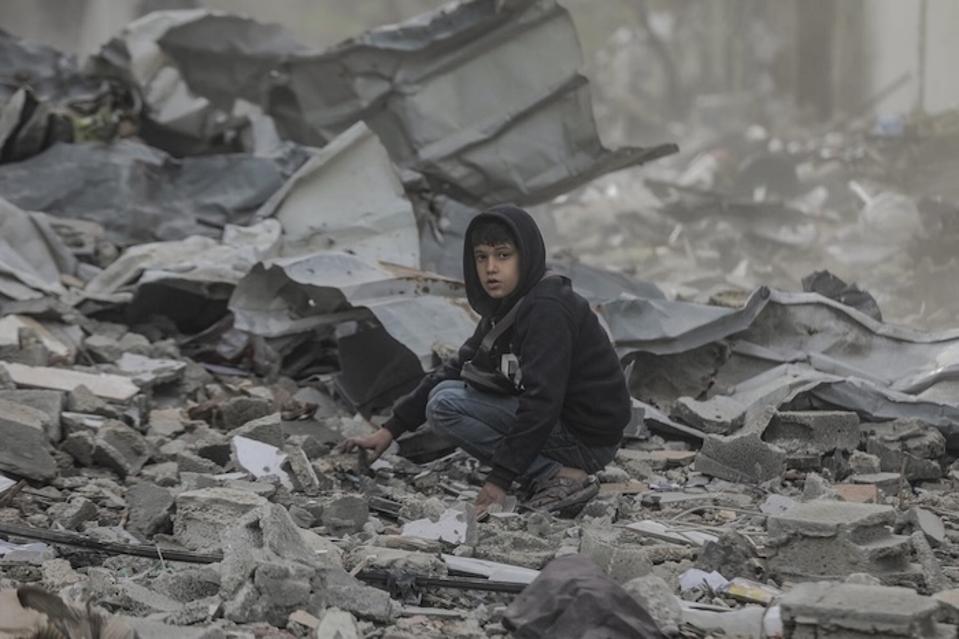After more than 18 months of war, children in Gaza are being pushed to the brink. “All parties to the conflict must allow and facilitate the rapid and unimpeded passage of humanitarian assistance,” says UNICEF Executive Director Catherine Russell.
For 1 million children unable to flee in search of safety, humanitarian aid has provided the only lifeline
Families are struggling to survive in the Gaza Strip where all humanitarian assistance — including food, fuel and medicines — has been blocked from entry since March 2, putting the lives of children at extreme risk.
“For two months, children in the Gaza Strip have faced relentless bombardments while being deprived of essential goods, services and lifesaving care,” UNICEF Executive Director Catherine Russell said in a statement issued on May 2. “With each passing day of the aid blockade, they face the growing risk of starvation, illness and death – nothing can justify this.”
Before the ceasefire collapsed, UNICEF delivered nearly 1,000 truckloads of humanitarian aid to Gaza
Between the start of the ceasefire on Jan. 19, 2025 and its breakdown in March, UNICEF delivered nearly 1,000 trucks filled with urgently needed humanitarian aid, including vaccines, nutrition supplies and medical equipment.
Now supply stocks replenished during the ceasefire are close to running out. Bakeries are shutting their doors and market shelves are almost bare.
Children are being deprived of food and safe water; diseases are spreading
In the past month, over 75 percent of households have reported deteriorating access to water — they don’t have enough water to drink, are unable to wash their hands when needed and are often forced to choose between showering, cleaning and cooking.
Vaccines are quickly running out and diseases are spreading. Acute watery diarrhea now accounts for one in every four cases of disease recorded in Gaza. Most of these cases are among children under 5, for whom it is life-threatening.
Malnutrition is also on the rise. More than 9,000 children have been admitted for treatment of acute malnutrition since the beginning of the year. Hundreds more children in desperate need of treatment are not able to access it due to the insecurity and displacement. Since March 18, hostilities have intensified, resulting in 390,000 people being newly displaced with nowhere safe to go.
UNICEF will stay and deliver for children in Gaza
UNICEF remains in the Gaza Strip, doing what it can to support and protect children. During the month of March, despite the stoppage of aid entry since March 2, UNICEF and partners continued to deliver services including:
- Resumption of neonatal health care services in the north — the lives of 150 newborns were saved thanks to the provision of 21 respiratory machines for babies to several hospitals
- Increased access to safe water, particularly in the north — more than 1.6 million people received clean water in the Gaza Strip at some point, with more than 500 cubic meters of clean water distributed daily in the north through water trucking
- Prevention of family separation — more than 300 children were reunited with their parents after having been separated by displacement orders and intense strikes, through the distribution of identity bracelets
- Provision of psychosocial support — more than 7,200 children received mental health and psychosocial support, and nearly 200 very vulnerable children received dedicated support
- Addressing malnutrition — More than 7,800 children under age 2 were reached with ready-to-use complementary food (RUCF) and more than 33,500 were screened for malnutrition
- Continued support for learning — UNICEF provided learning for more than 16,000 children in just one month through temporary learning spaces, community-led initiatives and schools
- Sustained humanitarian cash transfers — UNICEF has reached more than 133,000 people, including over 76,000 children, with multi-purpose cash channeled through digital e-wallets. Priority was given to pregnant and breastfeeding women and families with multiple children. This assistance helps families meet their very basic needs, including food, medicine and hygiene items, when these goods are available for sale in markets
UNICEF continues to call for the rapid and unimpeded passage of humanitarian assistance, the release of all hostages and the protection of all children
“International humanitarian law requires authorities to ensure that the population under their control is treated humanely,” said Russell. “This not only includes ensuring that civilians have the food, medicine and essential supplies they need, but also ensuring sufficient hygiene and public health standards.
“All parties to the conflict must allow and facilitate the rapid and unimpeded passage of humanitarian assistance. And they must allow and facilitate all relevant UN entities to carry out those activities for the benefit of the local population,” Russell continued. “We reiterate our call for the aid blockade to be lifted, for the entry of commercial goods into Gaza, for the release of the hostages and for the protection of all children.”
Your contribution to UNICEF is more important than ever. Please donate.
Right now, the lives of the most vulnerable children hang in the balance as conflicts and crises jeopardize the care and protection that they deserve. Dependable, uninterrupted and effective foreign aid is critical to the well-being of millions of children. Please contact your members of Congress and urge them to support ongoing U.S. investments in foreign assistance.

